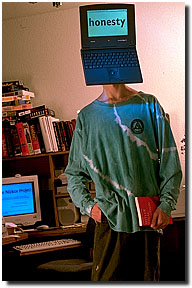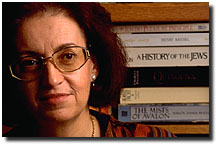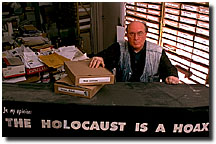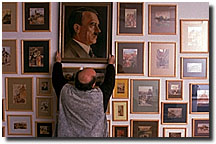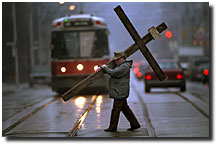|
 rnst Zuendel proclaims himself "a 56-year-old, pot-bellied, balding idea man, a dissident in the true sense of the word."
rnst Zuendel proclaims himself "a 56-year-old, pot-bellied, balding idea man, a dissident in the true sense of the word." Zuendel's description omits interesting parts of his resume: He is a German immigrant in Canada who has devoted a wall in his bunkerlike home to portraits of Adolf Hitler and other fascist icons. He is the author of a tract asserting that Nazi Germany's slaughter of 6 million Jews during World War II never happened. He won a landmark freedom-of-speech case that went all the way to the Canadian Supreme Court. And he has attracted a wide following with a slick World Wide Web pulpit he calls The Zuendelsite. Ernst Zuendel's activities have placed him at the center of the growing storm over Internet censorship. German authorities on the alert for neo-Nazi propaganda have tried to block access to his website. Internet free-speech partisans have responded by "mirroring" Zuendel's site with the disclaimer "not by me; not my views." The Simon Wiesenthal Center, a Los Angeles-based agency that fights anti-Semitic and other hate groups, has called for Internet service providers to bar access to sites such as Zuendel's. A second group, called Nizkor (Hebrew for "remember") is dedicated to rebutting Zuendel's claims point by point.
U.S. Supreme Court Justice Oliver Wendell Holmes Jr. wrote the classic American dictum on the free exchange of ideas in 1919: "The best test of truth is the power of the thought to get itself accepted in the competition of the market." This is a notion that will be tested in cyberspace as it has never been tested before. Hilary Ostrov, who runs Nizkor with Jamie McCarthy, believes in taking on Zuendel and other Holocaust deniers in open debate. She derides the revisionists as anti-Semites and their Internet discussion groups as a "daily dose of denier drivel." But despite a steady stream of threats against Nizkor, she insists that "the best way to counter Holocaust revisionism is to let the revisionists speak." Or, in the words of linguist Noam Chomsky, "It would be a disservice to the memory of those who perished in the Holocaust to adopt a central dogma of their murderers." Nevertheless, Ostrov is concerned that Holocaust deniers, including Zuendel and other hatemongers, may be more persuasive in the glitzy context of the Web. "Coated with the patina of professionalism a Web page affords, the distortions and lies await the click of the unsuspecting reader," she says. The Wiesenthal Center espouses a tougher approach. It patrols cyberspace for hate through its "global situation room." Arguing that "the information superhighway has transformed the rules of engagement in the marketplace of ideas," the center is asking Internet service providers to take aggressive steps to block access to hate material. The center's associate dean, Rabbi Abraham Cooper, likens such controls to standards used by the print and broadcast media. Those who defend free speech on classic liberal grounds or who hold that the Internet is a space that should be totally unfettered by regulation of content reject Rabbi Cooper's approach -- thus, the rush by freedom-of-expression guerrillas to mirror Zuendel's neo-Nazi rants after Germany's attempts to silence him. Civil libertarians, hatemongers, and human rights groups are battling in an arena with limits that no one can identify, much less understand. For many people, the potential danger of neofascist militants recruiting in cyberspace dwarfs other worries, such as children's access to smut, but recklessly limiting the right to speak poses its own dangers. This issue won't be settled quickly or quietly. The same words Justice Holmes used to sum up the U.S. Constitution apply with equal weight to the Internet: "It is an experiment, as all life is an experiment."
|





